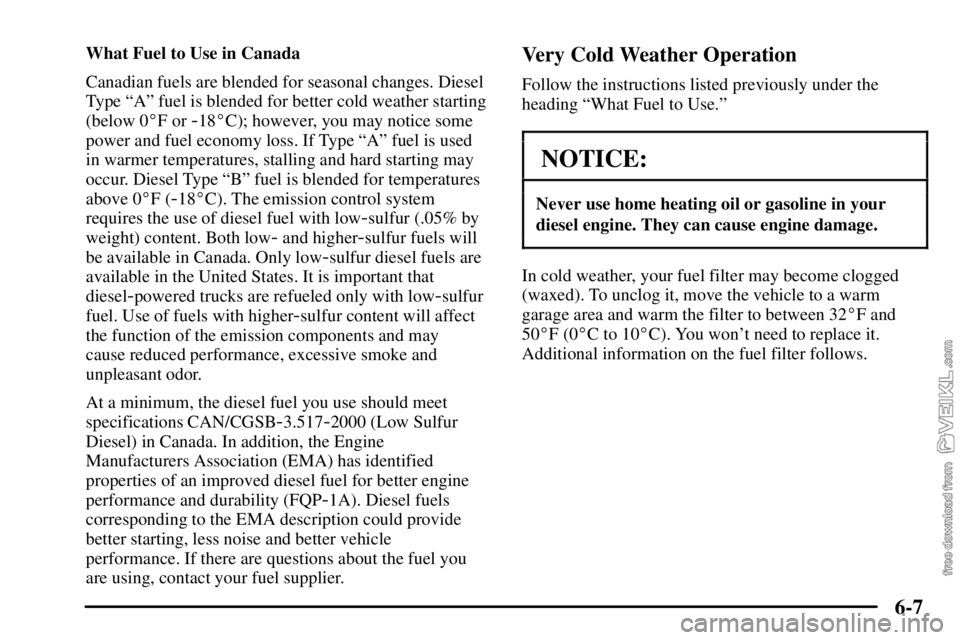Page 251 of 386

5-26
Engine Fan Noise
Your vehicle has a clutched engine cooling fan. When
the clutch is engaged, the fan spins faster to provide
more air to cool the engine. In most everyday driving
conditions, the clutch is not fully engaged. This
improves fuel economy and reduces fan noise. Under
heavy vehicle loading, trailer towing and/or high outside
temperatures, the fan speed increases when the clutch
engages. So you may hear an increase in fan noise.
This is normal and should not be mistaken as the
transmission slipping or making extra shifts. It is merely
the cooling system functioning properly. The fan will
slow down when additional cooling is not required and
the clutch disengages.
You may also hear this fan noise when you start the
engine. It will go away as the fan clutch disengages.
If a Tire Goes Flat
It's unusual for a tire to ªblow outº while you're driving,
especially if you maintain your tires properly. If air goes
out of a tire, it's much more likely to leak out slowly.
But if you should ever have a ªblowout,º here are a few
tips about what to expect and what to do:
If a front tire fails, the flat tire will create a drag that
pulls the vehicle toward that side. Take your foot off the
accelerator pedal and grip the steering wheel firmly.
Steer to maintain lane position, and then gently brake to
a stop well out of the traffic lane.
A rear blowout, particularly on a curve, acts much like a
skid and may require the same correction you'd use in a
skid. In any rear blowout, remove your foot from the
accelerator pedal. Get the vehicle under control by
steering the way you want the vehicle to go. It may be
very bumpy and noisy, but you can still steer. Gently
brake to a stop
-- well off the road if possible.
If a tire goes flat, avoid further tire and wheel damage
by driving slowly to a level place and turn on your
hazard warning flashers. The next part tells you what
to do.
Page 260 of 386

6-6 What Fuel to Use
In the United States, for best results use Number 2-D
diesel fuel year
-round (above and below freezing
conditions) as oil companies blend Number 2
-D fuel to
address climate differences. Number 1
-D diesel fuel
may be used in very cold temperatures (when it stays
below 0�F or
-18�C); however, it will produce a power
and fuel economy loss. Avoid the use of Number 1
-D
diesel fuel in warm or hot climates. It may result in
stalling, poor starting when the engine is hot and may
damage the fuel injection system.
At a minimum, the diesel fuel you use should meet
specifications ASTM D975
-00 (Grade Low Sulfur) in
the United States. In addition, the Engine Manufacturers
Association (EMA) has identified properties of an
improved diesel fuel for better engine performance and
durability. Diesel fuels corresponding to the EMA
Recommended Guideline on Premium Diesel Fuel
(FQP
-1A) could provide better starting, less noise and
better vehicle performance. If there are questions about
the fuel you are using, contact your fuel supplier.Diesel fuel may foam when you fill your tank. This can
cause the automatic pump nozzle to shut off, even
though your tank isn't full. If this happens, just wait for
the foaming to stop and then continue to fill your tank.
CAUTION:
Heat coming from the engine may cause the fuel
to expand and force the fuel out of your tank. If
something ignites the fuel, a fire could start and
people could be burned. To help avoid this, fill
your fuel tank only until the automatic nozzle
shuts off. Don't try to ªtop it off.º
Page 261 of 386

6-7
What Fuel to Use in Canada
Canadian fuels are blended for seasonal changes. Diesel
Type ªAº fuel is blended for better cold weather starting
(below 0�F or
-18�C); however, you may notice some
power and fuel economy loss. If Type ªAº fuel is used
in warmer temperatures, stalling and hard starting may
occur. Diesel Type ªBº fuel is blended for temperatures
above 0�F (
-18�C). The emission control system
requires the use of diesel fuel with low
-sulfur (.05% by
weight) content. Both low
- and higher-sulfur fuels will
be available in Canada. Only low
-sulfur diesel fuels are
available in the United States. It is important that
diesel
-powered trucks are refueled only with low-sulfur
fuel. Use of fuels with higher
-sulfur content will affect
the function of the emission components and may
cause reduced performance, excessive smoke and
unpleasant odor.
At a minimum, the diesel fuel you use should meet
specifications CAN/CGSB
-3.517-2000 (Low Sulfur
Diesel) in Canada. In addition, the Engine
Manufacturers Association (EMA) has identified
properties of an improved diesel fuel for better engine
performance and durability (FQP
-1A). Diesel fuels
corresponding to the EMA description could provide
better starting, less noise and better vehicle
performance. If there are questions about the fuel you
are using, contact your fuel supplier.
Very Cold Weather Operation
Follow the instructions listed previously under the
heading ªWhat Fuel to Use.º
NOTICE:
Never use home heating oil or gasoline in your
diesel engine. They can cause engine damage.
In cold weather, your fuel filter may become clogged
(waxed). To unclog it, move the vehicle to a warm
garage area and warm the filter to between 32�F and
50�F (0�C to 10�C). You won't need to replace it.
Additional information on the fuel filter follows.
Page 382 of 386

8-2
Customer Satisfaction Procedure
Your satisfaction and goodwill are important to your
dealer and to Chevrolet. Normally, any concerns with
the sales transaction or the operation of your vehicle
will be resolved by your dealer's sales or service
departments. Sometimes, however, despite the best
intentions of all concerned, misunderstandings can
occur. If your concern has not been resolved to your
satisfaction, the following steps should be taken:
STEP ONE -- Discuss your concern with a member
of dealership management. Normally, concerns can
be quickly resolved at that level. If the matter has
already been reviewed with the sales, service or parts
manager, contact the owner of the dealership or the
general manager.
STEP TWO -- If after contacting a member of
dealership management, it appears your concern cannot
be resolved by the dealership without further help, contact
the Chevrolet or GMC Consumer Relations Manager
by calling 1-800-TO-CHEVY (1-800-862-4389).
In Canada, contact GM of Canada Customer
Communication Centre in Oshawa by calling
1-800-263-3777 (English) or 1-800-263-7854 (French).We encourage you to call the toll-free number in order
to give your inquiry prompt attention. Please have the
following information available to give the Customer
Assistance Representative:
�Vehicle Identification Number (This is available
from the vehicle registration or title, or the plate
at the top left of the instrument panel and visible
through the windshield.)
�Dealership name and location
�Vehicle delivery date and present mileage
When contacting Chevrolet, please remember that your
concern will likely be resolved at a dealer's facility.
That is why we suggest you follow Step One first
if you have a concern.
Customer Assistance for Text
Telephone (TTY) Users
To assist customers who are deaf, hard of hearing, or
speech
-impaired and who use Text Telephones (TTYs),
Chevrolet has TTY equipment available at its Customer
Assistance Center. Any TTY user can communicate
with Chevrolet by dialing: 1
-800-833-CHEV
(1
-800-833-2438). (TTY users in Canada can
dial 1
-800-263-3830.)
Page:
< prev 1-8 9-16 17-24